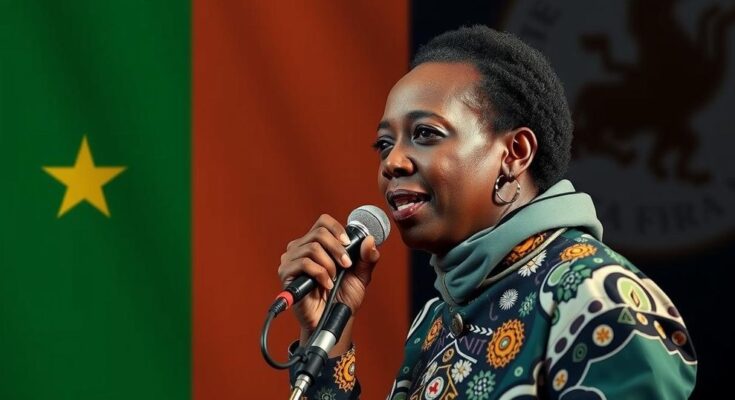Namibia is set to hold presidential elections on November 27, 2024, where Vice President Netumbo Nandi-Ndaitwah may become the nation’s first female president. Approximately 1.4 million voters are registered, with SWAPO leading in early polling despite past electoral setbacks due to corruption issues. Key issues include job creation and women’s rights, as the political landscape evolves amid competition from other parties.
Namibia is poised to potentially elect its first female president in the upcoming elections on November 27, 2024. Vice President Netumbo Nandi-Ndaitwah of the South West Africa People’s Organization (SWAPO) is leading in early polling results. Approximately 1.4 million Namibians have registered to vote across 15 political parties as they prepare to cast their votes. SWAPO, which has held power since Namibia’s independence in 1990, faces an electoral landscape altered by its loss of a two-thirds majority in 2019, attributed to corruption allegations in the fishing industry.
Political analysts emphasize that SWAPO cannot rely solely on its past successes, given the discontent among younger voters who are disconnected from the party’s historical narrative. Nandi-Ndaitwah, at 72, has proposed ambitious job creation plans to combat high youth unemployment, pledging significant financial investment over the next five years. Gender issues, including reproductive rights and equal pay, are also central to the campaign.
Nandi-Ndaitwah’s potential presidency could align her with historic female leaders such as Ellen Johnson Sirleaf of Liberia. However, should she ascend to leadership, she must prioritize independence and transparency, promoting greater women’s participation in politics. The electoral competition remains sharp, especially against the Independent Patriots for Change (IPC) and the Affirmative Repositioning party. Southern Africa’s political scene is dynamic, with recent seismic shifts in neighboring countries further emphasizing the significance of these elections in Namibia.
The elections in Namibia are significant as they may lead to the country’s first female president, reflecting broader themes of gender representation in leadership roles across Africa. With Vice President Nandi-Ndaitwah at the forefront, the political climate is complicated by SWAPO’s challenges in maintaining public support, especially after losing its supermajority in 2019. Allegations of corruption have marred the party, spurring calls for accountability and innovative approaches to governance. The youth demographic’s detachment from political legacies poses a challenge, urging parties to appeal directly to their needs and aspirations. Internationally, Namibia’s elections could influence the political dynamics within the region, where electoral outcomes have recently reshaped governance in multiple African nations.
In conclusion, Namibia could witness a historic moment with the potential election of its first female president, Netumbo Nandi-Ndaitwah. As SWAPO attempts to navigate a politically frayed landscape, the focus on job creation, youth engagement, and women’s issues may define the campaign’s success. Given the contemporary context of electoral volatility in Southern Africa, these elections not only concern Namibia but may also resonate throughout the region, underscoring the importance of leadership evolution.
Original Source: apnews.com




